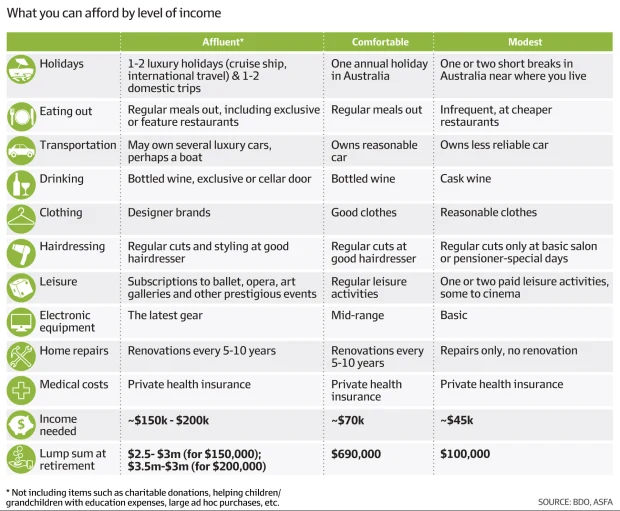What an Australian Retirement on $3 Million Looks Like
There are retirement plans to fit every budget, whether it is for luxury family vacations abroad or more affordable local getaways.

Every week, almost 3000 Australians retire, and for many, the biggest concern is whether they have enough money saved.
What the Association of Super Funds of Australia refers to as its retirement income benchmark, which aims to illustrate the difference between what is required for a “modest” and “comfortable” retirement, is updated on a regular basis.
The analysis reveals that, under the assumption of mortgage-free home ownership, the annual budget for a couple looking for a pleasant lifestyle is roughly $70,000 and $45,000 for moderate.
Consultancy BDO has used such data to provide some estimates.
Consultancy BDO has built some estimations of what may be considered a wealthy lifestyle. A lump sum at retirement of between $2.5 million and $3 million might, approximately speaking (very roughly speaking because there are so many limitations), give an annual income of about $150,000, according to Kelly Kennedy, a financial advisor with BDO.
A couple can probably afford two luxury vacations each year, home improvements every five to ten years, and full health insurance at this level.
Kennedy explains that the most typical error is not starting the planning process early enough. “Everyone’s retirement planning is a puzzle with unique pieces that fit their lifestyle,” she says. Before they formally retire, she adds, it is crucial for couples to come to an understanding regarding their expectations and goals.
Being on the same page can make it easier to make adjustments or compromises in the run-up to retirement.
A couple retiring with “modest” private assets of about $100,000 and eligibility for the government-funded age pension, which provides them with $45,000 year, would have a budget that is roughly four times that of wealthy retirees.
As evidenced by official data from the Australian Bureau of Statistics, retirement is becoming a longer period of life. Women typically have a 20-year life expectancy after retirement, compared to 16 years for men.

Image Credit: AFR.com
So, where to start for your retirement plan?
The free MoneySmart Retirement Plan, which is sponsored by the government, can calculate retirement income from superannuation and the age pension, as well as how contributions, investment choices, and retirement age affect retirement income. It can also calculate how working part-time or taking a break from work affects a super balance.
The Association of Independent Retirees (AIR), which represents present and future partially and fully self-funded retirees, is headed by Wayne Strandquist. “The big questions new retirees ask are how much do they need for a comfortable retirement, how long will their savings last, will it keep up with inflation, and how can they make it last longer,” he says.
According to him, the age pension continues to be a crucial component of retirement planning for many Australians, especially for older retirees who need to supplement their depleted lump sums.
Live luxuriously.
Pre-retirees should keep track of their lifestyle and living expenses by checking their bank and credit card accounts over the course of three months, according to Olivia Maragna, co-founder of Aspire Retire Financial Services, which typically counsels high-net-worth clients. Then, multiply that figure by four to get an estimate of annual spending.
Many people claim they do not live lavishly, but they are startled to learn that their yearly budget is almost $250,000.
Paul Huggins, a fund manager, is more fortunate than most others since he can afford to live comfortably in retirement. A fulfilling existence, according to him, will allow one to indulge in activities like collecting beautiful art and drinking fine wine, playing golf for hours on end, travelling, or driving classic cars.
In spite of the fact that he is making allowances for the $100,000 to $250,000 average classic vehicle enthusiast’s budget, he asserts that retirees with a wide range of interests are the most successful. Huggins states, “I don’t have a retirement date. “I enjoy working and driving cars the most.”
Other future retirees might find budgeting and planning a little more difficult.
The first stage, according to Bec Wilson, author of How to have an Epic Retirement and host of the new Prime Time by Nine podcast, which owns AFR Weekend, is to spend some time to develop a vision of life after work. According to her, the process could take months or even years. She said it is good to allocate some time to reflect on personal dreams and get as much inspiration from reading as you can.
The next stage is to turn those dreams into detailed line items from which a budget may be created. Wilson recommends that people must budget their retirement costs out in two separate spreadsheets — one for budgeting the cost of daily living and the other for budgeting out the one-off expenses.”
Both must be based on the precise itemised expenses people anticipate.
Given that retirees are typically in the best health during the first 10 to 15 years of retirement, Wilson advises paying special attention to those years.
Also, she added that there is a particular multigenerational family holiday that people wish to spend with their family to commemorate an important birthday or anniversary.
Then, consider how often people might want to replace their cars, how much money they want to set up for a periodic budget, and how that would translate to an annual amount. And consider what the budget would require for house upkeep or aging-in-place modifications.
To determine what it looks like for a retiree the total capital amount of these expenses over his lifetime is the third and last phase in the budgeting process. It is also crucial to seek advice.
Invest children’s inheritance
“Financial advisers have excellent software that they can plug all your budget numbers into and project how much you might need to live your retirement dreams, and they’ll keenly use all the hard work you’ve done here to get there,” says Wilson.
According to Kennedy of BDO, the amount needed for retirement varies depending on the client’s lifestyle, age, and if they want to leave something for their kids or “SKI,” which stands for “spend kids’ inheritance.”
She added that even clients have told her that the most recent check would bounce.
She also mentioned she had clients who wanted to preserve the value of their assets during retirement in order to leave a particular legacy. Some people could have altruistic and charitable goals. Clients also enquire about the impact on their capacity to fund their retirement if giving their adult children a down payment for a home.
Read: Superannuation vs. Mortgage
Kennedy includes expectations including the possibility that costs will fall by roughly 10% every five years while developing scenarios with clients.
According to her, underestimating the impact of inflation, which may be particularly harmful for those on fixed incomes, is one of the major mistakes made while planning for retirement.
Another is the risk of underestimating your life expectancy. Because it’s advisable to err on the side of caution, Kennedy generally models for her customers up to age 100.
Calculating the lump sum you will need to retire is similarly challenging. According to Wilson, it is insufficient to simply increase the annual budgeted expenses by the number of years you expect to live.
Thinking about how the entire investments will grow over time is what she advises. There is no need as much topline money as people think, according to the 10/30/60 rule of thumb, which states that we create 60% of our investment returns throughout our retirement years from the money we have invested.
According to a new Intergenerational Report, many retirees are living too modestly out of concern that they may outlive their money and won’t be able to pay for medical care.
Among those urging super funds to come up with new solutions to offer members confidence that their retirement assets will last is Treasurer Jim Chalmers.
With the help of their real estate holdings, 64-year-old Greg Lowe and his companion Marina are seeking to increase their super savings and generate roughly $70,000 in “comfortable retirement” income each year.
The maintenance worker in Canberra is constructing a three-bedroom apartment in the backyard of his investment home in Canberra to increase rental income.
Father of three adult children and three grandchildren Lowe says of his retirement income plan: “It may be pretty valuable.
Rent increases and high demand assist to balance off erratic gains in their account-based pension brought on by unpredictability in the global equity and bond markets.
For Lowe, the ASFA retirement lifestyle guide predicts the couple will be able to have one holiday in Australia a year, own a reasonable car and afford an occasional bottle of wine.
They will also be able to continue private health insurance, take part in a range of regular leisure activities and buy good clothes.
Brendan Ryan, principal of Later Life Advice, an independent financial adviser, says couples who own a home and have an asset test threshold of just over $1 million could still be eligible for a part-age pension. Ryan also added, “If you are eligible for $1 of pension you can unlock a suite of discounts, entitlements, rebates and preferential thresholds.”
Some retirees experiment with strategies to increase their budgets, such as tapping equity in the family home, downsizing, and increasing super contributions.
According to Frank Walmsley, a director of Canberra Granny Flat Builders, many people approaching retirement have large gaps in their super because obligatory financing was not implemented until 1992.
“They are using a second house on their property to generate income for their retirement,” Walmsley said. He states that in Canberra, ordinary three-bedroom backyard apartments costing roughly $300,000 generate rents of around $700 per week.
Please contact us if you have any questions about super plans or if you want to seek professional advice.

About Lan Nguyen
Lan is the Founder and Chief Strategist at Success Accounting Group, Melbourne based CA firm. In a matter of short 8 years she has built up a reputable Chartered accounting firm with 3 offices and a team of 6 professional accountants and support team members. Her mission is to provide Innovative and Strategic Financial advice to help her customers make smarter financial decisions today for a brighter future.
Success Accounting Group is for established business owners who would like help to grow a sustained business. As a business owner you understand what drives your business success with our accounting team taking care of the rest.




